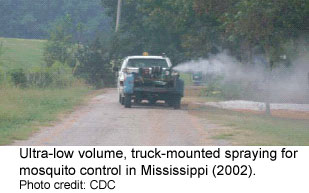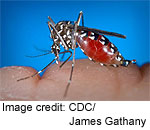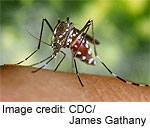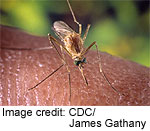 | To Spray or Not to
Spray? Pesticide Spraying for Mosquitoes that Carry West Nile Virus Did NOT Contaminate People |
|
Mosquitoes carry a variety of diseases that can be transmitted to humans. West Nile virus, a mosquito-borne disease that affects the nervous system, has spread to almost every state in the US. To control mosquitoes, officials sometimes spray pesticides to kill the insects. Some people worry that exposure to pesticides can cause human health problems. Three recent studies should help calm these fears: they show that people in areas sprayed with pesticides to control mosquitoes did not have elevated levels of pesticides.

Study 1: Mississippi, 2002 Why spray: Epidemic of West Nile virus.
Why spray: Epidemic of West Nile virus.What sprayed: Ultra-low volume spraying of the pesticide permethrin. Who tested: 125 people inside spray area; 67 people outside spray area. Results: The urine levels of pesticide metabolites in people inside and outside of the spray area were not statistically different. However, people who used pesticides on their pets had higher levels of pesticide metabolites in their urine than those people who did not use pesticides on their pets.
Study 2: North Carolina, 2003Why spray: Mosquito populations were expected to increase after the heavy rains brought by Hurricane Isabel in 2003.What sprayed: Ultra-low volume spraying of the pesticides naled and permethrin.  Who tested: 75 people inside of the spray area who provided urine samples
before and after the spraying.
Who tested: 75 people inside of the spray area who provided urine samples
before and after the spraying.Results: People inside of the spray area did not have increased levels of pesticide metabolites in their urine. However, people who worked on farms or handled pesticides as part of their jobs had higher pesticide levels than those people who did not work on farms or handle pesticides.
Study 3: Virginia, 2003Why spray: Mosquito populations were expected to increase after the heavy rains brought by Hurricane Isabel in 2003.What sprayed: Ultra-low volume spraying of naled and d-phenothrin. Who tested: 83 people inside of the spray area who provided urine samples before and after spraying. Results: There was no difference in the amounts of pesticide metabolites in the urine of people tested before and after spraying.
|
 Pesticides Used
|
|
References and more information:
|
| BACK TO: | Neuroscience In the News | Table of Contents |
![[email]](./gif/menue.gif) Send |
 Fill out survey |
 Get Newsletter |
 Search Pages |
 The results of these three studies are a breath of fresh air to those who
were concerned about the dangers of spraying the pesticides. Long-term
exposure to naled, permethrin and d-phenothrin can cause skin,
respiratory, digestive and nervous system problems. However, as these
studies show, the ultra-low volume spraying of these pesticides did not
appear to cause increased levels of the pesticides in people who lived in
the sprayed areas. This is good news to people who live in areas with
mosquitoes carrying West Nile virus.
The results of these three studies are a breath of fresh air to those who
were concerned about the dangers of spraying the pesticides. Long-term
exposure to naled, permethrin and d-phenothrin can cause skin,
respiratory, digestive and nervous system problems. However, as these
studies show, the ultra-low volume spraying of these pesticides did not
appear to cause increased levels of the pesticides in people who lived in
the sprayed areas. This is good news to people who live in areas with
mosquitoes carrying West Nile virus.